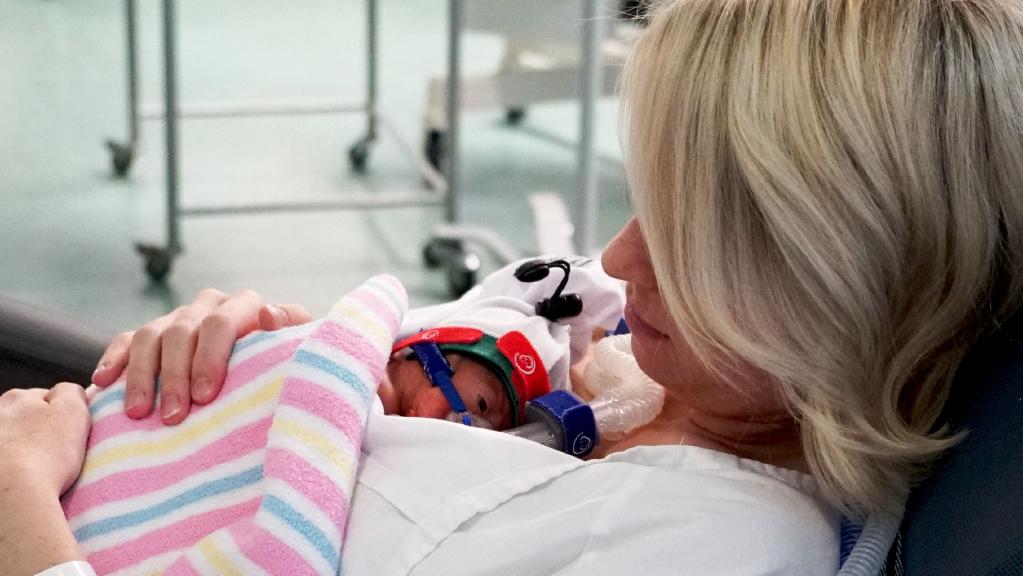
Baby girl born premature while mum still pregnant with her twin brother a month later
WHEN Danielle Paull was 19 weeks pregnant with twins, she was told they might not survive but in a medical miracle she gave birth to a healthy baby girl and is yet to deliver her second bub four weeks later.
Thanks to the incredible work of the Royal Hospital for Women at Randwick, baby Sadie was born premature at 24 weeks on October 26 while her baby brother is yet to make an appearance.
Known as delayed interval delivery, it is extremely rare for a mother to still be carrying a healthy baby twin almost a month after the birth of her first.

“He is doing really well,” Ms Paull told the Southern Courier. “We had an ultrasound yesterday and he weighs 1.1 kilos which is quite big for 28 weeks.
“Sadie was 710g. She is very tiny but a good weight for 24 weeks.”
Both babies grew in individual sacs with their own placenta which allowed them to grow together but be born apart in a real-life separation at birth scenario.
Ms Paull said she started dilating at 19 weeks and her cervix was 4cm in length.
But Sadie amazingly held on for another five weeks before a whirlwind birth in under two minutes although Ms Paull’s contractions went for another 24-hours before they suddenly stopped.
“We had two resuscitation units in the room,” she said.
Little Sadie has spent the first few weeks of her life in a $100,000 hi-tech incubator at the hospital’s Neonatal Intensive Care Unit (NICU) and being tube fed donated breast milk flown in from Queensland.

It costs $52 to keep a baby breathing on a ventilator for half an hour and nearly 80 per cent of the lifesaving equipment in the newborn intensive care unit is funded through donations.
She had experienced some complications but was doing “fine now”.
“Sadie is being fed through a tube through her mouth,” Ms Paull said. “I was not able to express (breast milk) because that might bring on labour.
“We have been getting donor milk from a milk bank in Queensland.
“It’s a charity ‒ there is no equivalent in NSW yet.”
Ms Paull said she was taken into intensive care with a pre-existing heart condition which was picked up by doctors during her pregnancy which exacerbated her condition.
“As we go on there will be further tests and things that will come about,” she said.
“They said she is doing well. It is a big relief.”
This is the first pregnancy for Ms Paull, a senior associate at Colin Biggers and Paisley Lawyers, and her graphic designer husband Matthew.

She said the couple had been researching delayed interval delivery and discovered a woman in Ireland who gave birth to twins and incredible 87 days apart.
“We are so happy just to get to this point,” Ms Paull said. “We are trying to stay positive.”
The Glenmore mum said she wanted to highlight the amazing work by hospital staff and the fact that 80 per cent of equipment is paid for through fundraising by the Royal Hospital for Women Foundation.
“I think it’s incredibly important the work the foundation does,” she said.
The Royal Hospital for Women at Randwick’s neonatal unit is the surgery centre for NSW, with 44 beds across three levels including intensive care.
Catherine Oates Smith, CEO of The Royal Hospital for Women Foundation, said 600 premature babies are cared for at The Royal every year.
“These precious lives might not survive without the lifesaving equipment in the newborn intensive care unit,” she said.
“The majority of that equipment is purchased through donations, so this Christmas I would like to give a big thank you to our supporters.
“Your donations save lives.”
To make a donation to the Royal Hospital for Women Foundation click here.

